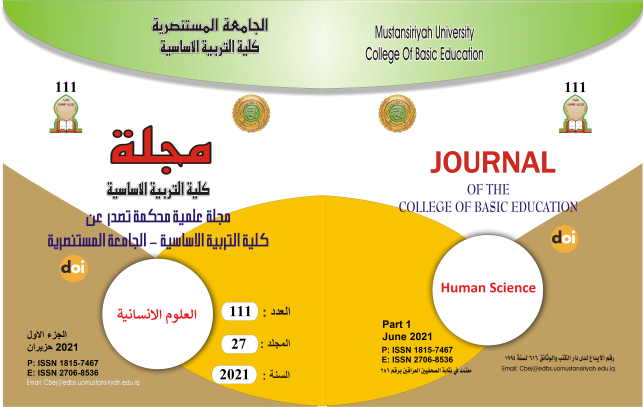(Symbolism in the Poetry of Dr. Khalid Ali Mustafa)
Main Article Content
Abstract
This study researches the technique of Symbolism in the poetic function of the poet Dr. Khalid Ali Mustafa for the following reasons:
- The importance of the artistic experience and symbolic recruitment as one of the new forms of techniques in modernism which gives the structure of symbols a depth different from old symbols in terms of the proximity of semantic openness to the depth of what is signified which can be achieved by a profound semantic engrossment the codes of which can only be broken after reading, deducing, and analyzing provided with a wide cultural reference knowledge which engages the recipient in the process of formulating open connotations of the poet's poetic text.
- The extreme obscurity that made his poems difficult to grasp for its recipients, and an examination of what makes them exclusive for the elite making his poetry unclear from the first read.
- Studying the poet’s levels of symbolic techniques, what are main areas on which the structure of symbolic recruitment took place for Dr. Khalid Ali Mustafa? Does those symbols, in all their different references and times, have a common thematic focus that is compatible with to poet’s experience being originally from Palestine but raised in Iraq?
This Paper was made in two sections, the first was identifying the poet himself and the old and new technique of symbolization, then discussing their reasons for the poet Khalid Ali Mustafa.
The second thesis was dedicated for the paper of his levels and techniques of symbolism and their diversity between personal, incidental, historical, or intertextual symbols with hidden connotation signs and verses from the Quran or Factual referral of an anthropological effect whether it was social, ideological, or involved tales spread as sublimity or hideousness whether they are realistic or referrals of mythical tales. This paper relied on the inductive analytical reasoning and the descriptive approach in the process of investigating, analyzing, and referring the symbolic functions of the poet. The study paper concluded that the thematic focus of these mysterious waivers and symbolisms is the open wound that he carries inherently due to the fact that he’s refugee in another country away from his homeland, a child who has the imagery of dust, wailing, and the pain of migration carved in his soul and reflected as a poetic function in his poetic experience carrying the Palestinian issue in all its dimensions.
Perhaps, disguising as a deep bleeding wound which he hides in his soul lead to it being manifested in the hidden symbolic connotations deeming them mysterious and subtle making it ambiguous for near-connotation minded people. His symbolism was enhanced by an enigmatic cultural knowledge which he gained from his academic persona as well as his eagerness to read and love to everything that is unusual or has an effective impact on his urban surroundings. As for the interconnected structure of the symbols, they tend to employ intense overlapping symbols which can be referred to in only one sentence indiscriminately, then, Syntactically semantic overlapping with other symbols in a single structure as if they are fragments that are not interconnected, but they open up in content with the distant successive readings of the text in the mind of the knowledgeable recipient, and then regrouping their fragments in the recipient's cultural references in order to decipher the exclusiveness and ambiguity of the poetic recruitment of the poet Dr. Khaled Ali Mustafa in his text, and here the secret lies in its ambiguity.
Article Details

This work is licensed under a Creative Commons Attribution-ShareAlike 4.0 International License.
